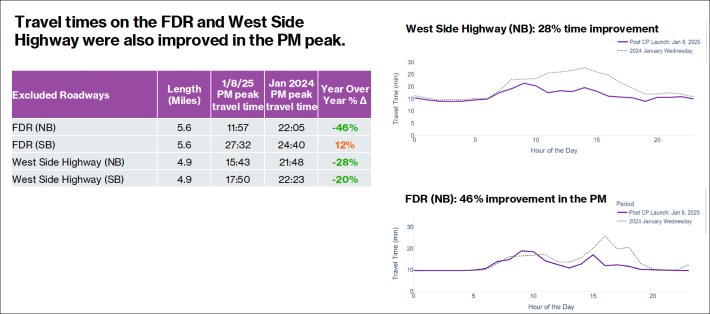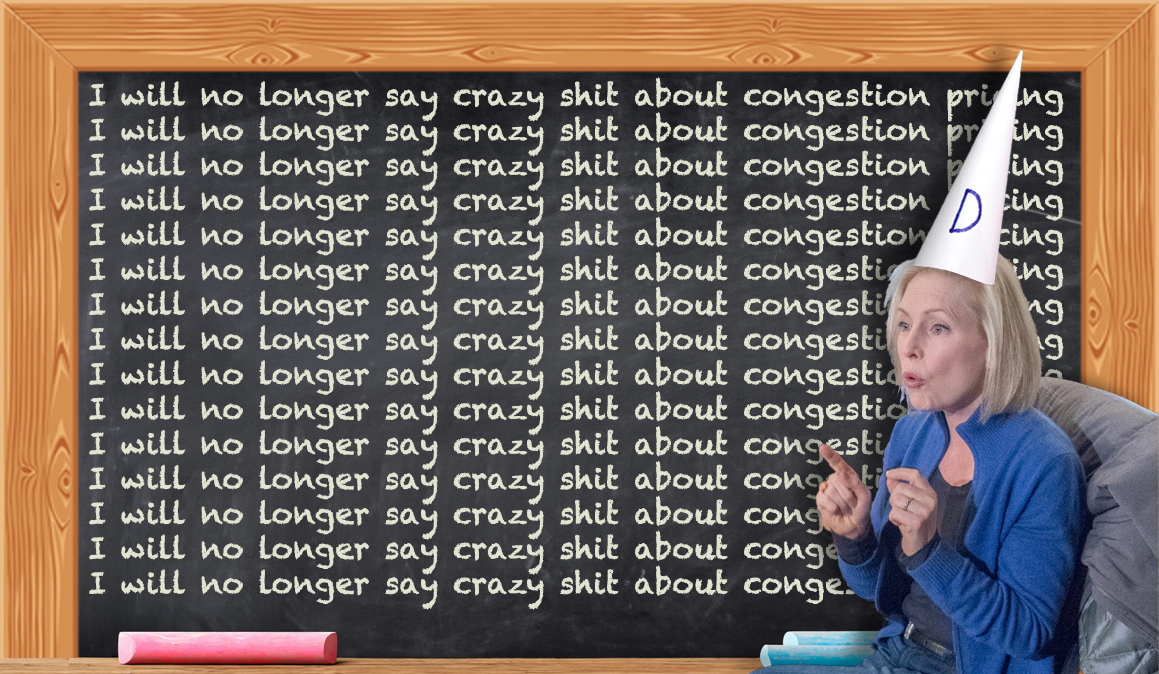Sen. Kirsten Gillibrand seems hard pressed to say anything good about congestion pricing, which has already reduced Manhattan traffic while improving bus speeds, reducing crashes and juicing MTA coffers.
Instead, in TV and radio interviews this week, the upstate New Yorker trotted out bogus talking points from the toll's opponents while pushing for exemptions for firefighters and other "critical" workers whom she insisted are adversely affected by the toll.
On NY1 on Monday and on WNYC on Tuesday, Gillibrand parroted the firefighters union claim that its members shouldn't be required to pay the congestion toll because the toxins on their equipment — which they must lug back and forth among job sites — would sicken subway passengers.
"I want to make sure we can look at waivers for firefighters, because they need to drive into the city with their equipment, because there's toxins on their equipment," Gillibrand told NY1's Pat Kiernan — echoing arguments made by the Uniformed Firefighters Association when congestion pricing launched last month.
She dug into the claim to WNYC's Brian Lehrer on Tuesday:
"When they come into the city, they drive in with their equipment in their cars that have toxins on them, that have forever chemicals like PFOA. If they had to take mass transit into the city, they would be bringing their equipment on a train where they would be leaving forever chemicals in the seat they placed it for the next passengers to get a carcinogen all over their clothes. So that is not safe. If you don't provide a waiver for them, then what will have to happen is we'll have to spend billions of dollars to build them new facilities somewhere in New York City for them to have large lockers to have places to store their equipment.
Emerging research has called attention to carcinogenic so-called "forever chemicals" in firefighting gear. Two recent studies by the National Institution of Standards and Technology found that textiles in smokeaters' gear contain such chemicals, which release more over time due to wear-and-tear.
One solution, of course, is what Massachusetts and Connecticut did: They banned the use of such chemicals in firefighter equipment so that the firefighters and their families could be safe.
But Gillibrand proposes different solutions: Either discourage firefighters from taking mass transit so that their cars can spew more toxins into the air (while the toxins in their clothing continue to be released into their personal vehicles and homes) — or spend billions of dollars on facilities to store equipment overnight. Seems like solving the toxic fabric issue is much easier.
Also, requiring firefighters to live in the city (or at least assigning them more efficiently so they don't need to drive around all day) is also a solid option.
Each additional congestion pricing exemption means more cars on the road, less money for the MTA and more pollution in the air. For that reason, state and MTA officials have so far been extremely limited in dolling them out, despite requests from nearly every constituency imaginable.
Gillibrand made a number of other sketchy claims during the two interviews. She suggested that "critical" workers "who have to come in off-hours" should get an exemption, even though the overnight congestion toll is less than the cost of a single subway ride. She claimed without evidence that less traffic means less business for merchants in the Central Business District. And she claimed, without evidence, that the toll had led to more traffic in the Bronx and Queens.
Confusingly, Gillibrand made contradictory points in the two interviews about traffic on the FDR Drive and West Side Highway — all of them false. On NY1, she claimed the toll had resulted in more traffic on the two roads, which sit just outside the new tolling zone. On WNYC, she said she hadn't "gotten any data or information" about travels times on those roads. But the MTA in fact reported a week after the toll launched that evening rush hour traffic dropped on both roads, with the exception of the southbound FDR, where it jumped 12 percent. The MTA also posts datasets, including traffic on the two roads, online every day. A transit source said officials are in regular contact with Gillibrand's office.

The two presentations had the air of a high school book report — with Gillibrand appearing to glance at her notes during her NY1 comments. On WNYC, she gave a 685-word rambling answer to a simple question of if she supports President Trump nixing the toll (she said no), while repeatedly saying it passed "20 years ago" (it passed in 2019, which is less than six years ago).
Gillibrand, whom New Yorkers re-elected by a wide margin in November, declined both times to support the merits of the toll, which she claimed has "positive and negatives."
Streetsblog reached out to the senator's office several times on Monday and Tuesday, but no one got back to us.
Riders Alliance spokesman Danny Pearlstein suggested that Gillibrand hop on the congestion pricing express as the toll's popularity increases.
"Sen. Gillibrand surely doesn't want to make millions of New Yorkers late again or kill hundreds of thousands of construction jobs," Pearlstein said. "She has plenty to do in Washington as it is."






